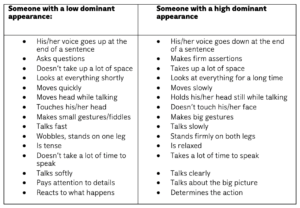Do you want to make a good impression on your audience?
Before I reveal the answer, I want to tell you something else. Namely, that this knowledge, “how you influence your audience positively”, has been known for 2.500 years. Nowadays, this knowledge is supported by the most renowned scientists. How cool is that?
About 2.500 years ago Aristoteles (comment 1) wrote that the credibility, the impression of a speaker depends on the expertise, kindness and honesty of the speaker.
In other words, the speaker:
- Knows what he/she is talking about.
- Has the interests of the audience in mind.
- Will not betray the audience.
If the speaker meets all of those criteria, the audience will be open to listen and be inclined to let him/herself be convinced by the speaker.
But, what do today’s eminent social psychologists say on the subject? Professor Susan Fiske of Princeton University has been researching perception and judgement for years. According to her, we scan each other for 2 characteristics in no time.
1) We see how warm (reliable) we find the other person (The kindness and honesty of Aristoteles!)
2) And, how strong (competent). (The expertise of Aristoteles!) (comment 2)
Of course, we also look at other characteristics, but warmth and competence are responsible for as much as 90% of our positive or negative judgment.
But, what does this mean for us as speakers?
2 things are important here.
1) Judging and determining mostly happens at the beginning of your presentation.
2) A big part of it is determined by nonverbals!
The audience judges you, unconsciously, on how relaxed you look (warmth). It sees how much space you take up and for how long you look at something (competence). These are all crucial elements of judging your warmth and competence, and therefore are very important.
Ok, but how can you influence this non-verbal part in a positive way?
Competence:
The audience judges “high status” behavior often as competent. However, “high status” behavior should always go hand in hand with being open and in contact with the audience (warm). If not, you may come across as arrogant or pushy.
But, what does this “high status” behavior entail?
The archetype from theatre that symbolizes this status is the King (high status) and for low status, the Joker or the Clown.The King moves slowly and majestic. He takes his time to speak and keeps his head held high. He has a low voice that resonates.
The Joker is small and has a low-set posture, jumps quickly. He looks around nervously and has a high-pitched, strange, sharp laugh. From his submissive position he looks at the King questioningly, asking for permission.
Of course, these are “archetypes” and super “stereotypes”. However, there is some truth in it, and it shows a lot about nonverbal communication and how that is stored in our collective memory.
Take a look at the model below, where you can see what could be perceived as “high” and “low status”.
What can you do?
In short: you can record yourself while practicing aloud and rewatch it. How do you come across? Are you unconsciously making yourself small? Do you fiddle with your hands? Do you tend to tilt your head, while speaking? Do you wobble on one leg?
Of course, these things are not a problem.
However, try again and keep your head a little more erect. Make your gestures firmer, instead of the fiddling. Focus a bit more, instead of scanning the room restlessly and see how you come across now. Really, it can make a big difference and your audience registers all of this, unconsciously! And they form an opinion, based on all these non-verbal signals!
Besides, we all tend to, compensate our nerves at the beginning of a presentation (when the audience forms an opinion) by for instance being a bit more timid, making ourselves a bit smaller and speaking a bit softer. We often do this unconsciously. So, to be a little more aware of this and of the effect it has on the audience, will not hurt us.
Warmth:
Do you want to know how you may influence your impression of “warmth” on your audience in a positive way? Watch the video of Mark Bowden below, by clicking on the link.
Film Mark Bowden: one and a half minutes.
Turn up the volume
Click on the link.
Do you want to watch the whole hilarious Ted talk by Mark Bowden on Youtube? Look up: The Importance of being Inauthentic, Mark Bowden.
Good luck!!
Comment 1: Aristoteles is a philosopher who lived around the year 500 before Christ and wrote the book Rhetorica. Rhetorics is about the art of convincing
Comment 2: Story design: Nobbe and Mieras.
Translated by Wies Linssen





